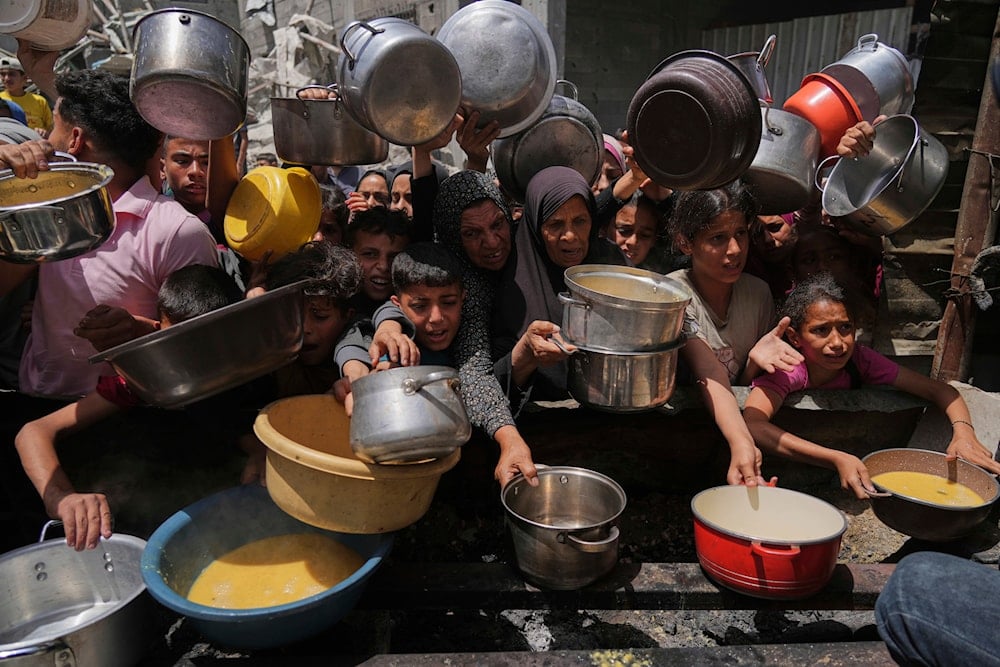No real aid has entered the Gaza Strip: Gaza Media Office
The Gaza government media office says only nine trucks of limited aid have entered in 80 days, blaming "Israel" for a deliberate starvation policy amid a worsening famine crisis.
-

Palestinians struggle to get donated food at a community kitchen in Jabalia, northern Gaza Strip, Monday, May 19, 2025. (AP)
The Gaza government media office stated that despite "Israel's" claims of allowing nine aid trucks into the territory, no substantial humanitarian assistance has reached the strip in over 80 days due to the ongoing siege and worsening famine conditions.
In a statement issued on Monday, the media office clarified that these nine trucks, which carried only limited nutritional supplements for children, represent a fraction of the 44,000 aid trucks that should have entered Gaza over the past 80 days, reiterating that the besieged enclave requires at least 500 aid trucks and 50 fuel trucks daily to meet its urgent humanitarian needs.
'Nothing more than a drop in the ocean'
While a total of 44,000 trucks should have entered Gaza over 80 days, the few allowed in on Monday amount to less than 0.02% of that number, prompting the media office to emphasize that these trucks "are nothing more than a drop in the ocean of urgent needs and fail to meet even the bare minimum requirements for survival" in the besieged enclave.
The media office further noted in its statement that Israeli authorities have completely shut down all crossings, "blocking even a single grain of wheat from entering for nearly three months, a deliberate starvation policy targeting 2.4 million people."
Gaza officials demand urgent global action
The office held both the Israeli occupation and the international community fully responsible for this ongoing humanitarian crime, demanding immediate global action to open the crossings without restrictions or conditions and allow the complete entry of humanitarian needs before it's too late.
The Gaza government media office had previously warned in an earlier Monday statement about worsening famine indicators and humanitarian collapse, stressing that this situation is "a direct result of systematic policies implemented by the occupation against civilians in their livelihoods and their very bodies."
'Israel' permits heavily limited entry of aid to Gaza
On May 18, Israeli Prime Minister Benjamin Netanyahu revealed plans for the restricted and prompt delivery of humanitarian assistance to the Gaza Strip, a move prompted by escalating pressure from the US and growing global condemnation regarding the severe famine crisis in the besieged region.
The announcement came during a session of the Israeli occupation’s security cabinet, though it was made without an official vote, a decision reportedly intended to circumvent the likely lack of majority support within the far-right-leaning body.
Israeli media reported that the meeting was quickly adjourned following Netanyahu's announcement, with ministers expressing their views but no formal vote taking place, despite far-right Police Minister Itamar Ben-Gvir's insistence on holding a vote, a request that was ultimately rejected.
UN, aid agencies warn of imminent famine
On Monday, the Integrated Food Security Phase Classification, a UN-backed mechanism, declared that famine was imminent in Gaza. The report warned that if "Israel" proceeds with its planned military escalation, “the vast majority of people in the Gaza Strip would not have access to food, water, shelter, and medicine.”
Most bakeries have closed, charity kitchens are shutting down, and the World Food Programme has already exhausted its food stocks.
As The New York Times detailed, the Trump administration is working with "Israel" on a plan to resume limited aid distribution via private organizations at centralized hubs inside Gaza. These sites, each expected to serve hundreds of thousands of people, would be surrounded by the Israeli military and patrolled internally by private security.
But the UN Office for the Coordination of Humanitarian Affairs rejected the plan, warning it would put civilians at greater risk by forcing them to traverse longer distances through potentially dangerous zones. According to UN agencies, the proposal “drastically reduces operational reach,” shrinking the number of distribution points from 400 to just a few.

 4 Min Read
4 Min Read









